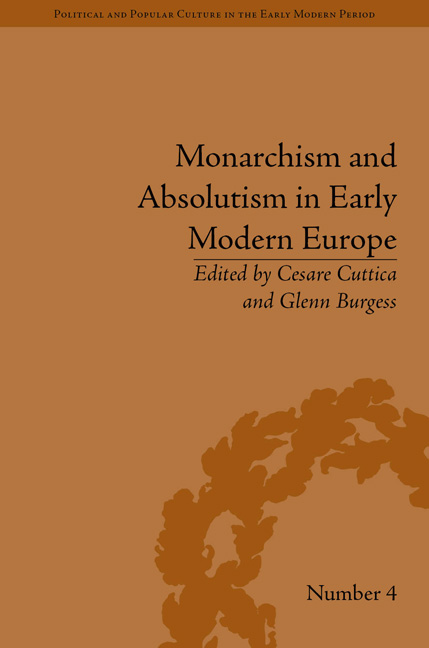Book contents
- Frontmatter
- CONTENTS
- Acknowledgements
- List of Contributors
- Introduction: Monarchism and Absolutism in Early Modern Europe
- Part I Royalists, Republicans, Patriarchalists: English Thinkers at Odds in the Seventeenth Century
- 1 A Culture of Political Counsel: The Case of Fourteenth-Century England's ‘Virtuous’ Monarchy vs Royal Absolutism and Seventeenth-Century Reinterpretations
- 2 Royalist Absolutism in the 1650s: The Case of Robert Sheringham
- 3 Patriarchalism and the Monarchical Republicans
- Part II Absolutism, Cynicism, Patriotism: Eighteenth-Century Enlightenment Reflections
- Part III Absolutism, Monarchism, Despotism in Theory and Practice: Contested Historiography and Comparative Approach
- Part IV Monarchy, the State of Nature, Religion and Iconography in European Perspective
- Notes
- Works Cited
- Index
2 - Royalist Absolutism in the 1650s: The Case of Robert Sheringham
from Part I - Royalists, Republicans, Patriarchalists: English Thinkers at Odds in the Seventeenth Century
- Frontmatter
- CONTENTS
- Acknowledgements
- List of Contributors
- Introduction: Monarchism and Absolutism in Early Modern Europe
- Part I Royalists, Republicans, Patriarchalists: English Thinkers at Odds in the Seventeenth Century
- 1 A Culture of Political Counsel: The Case of Fourteenth-Century England's ‘Virtuous’ Monarchy vs Royal Absolutism and Seventeenth-Century Reinterpretations
- 2 Royalist Absolutism in the 1650s: The Case of Robert Sheringham
- 3 Patriarchalism and the Monarchical Republicans
- Part II Absolutism, Cynicism, Patriotism: Eighteenth-Century Enlightenment Reflections
- Part III Absolutism, Monarchism, Despotism in Theory and Practice: Contested Historiography and Comparative Approach
- Part IV Monarchy, the State of Nature, Religion and Iconography in European Perspective
- Notes
- Works Cited
- Index
Summary
This chapter reflects on two hotly contested terms in the historiography of early modern England, ‘royalism’ and ‘absolutism’, through an investigation of the work and career of Robert Sheringham, noted linguistic scholar and fellow of Gonville and Caius College, Cambridge. Sheringham is now chiefly remembered for two publications – his book De Anglorum gentis origine (1670) which argued for the descent of the English people from the Goths – and his one political work, The Kings Supremacy Asserted, or A Remonstrance of the Kings Right against the Pretended Parliament, published in 1660 but circulating among royalist circles in the Netherlands in 1652–3. The Kings Supremacy has attracted the attention of many historians of royalism and English political thought. Though, as we will see, opinion on Sheringham's political philosophy remains divided, his pamphlet has nonetheless been acknowledged as an important addition to the royalist canon, James Daly describing it as ‘the best work of its length among royalist political works’.
This chapter will unpick the long accepted view of Sheringham as an unequivocal supporter of the royalist cause and use this investigation, in turn, to question his motivation for writing The Kings Supremacy. In suggesting that this work was not primarily the product of any long-standing commitment to the royalist cause, it contends that we need to think more of royalism and absolutism as flexible and contingent responses to particular circumstances, rather than as fixed identities or ideologies.
- Type
- Chapter
- Information
- Monarchism and Absolutism in Early Modern Europe , pp. 33 - 46Publisher: Pickering & ChattoFirst published in: 2014

